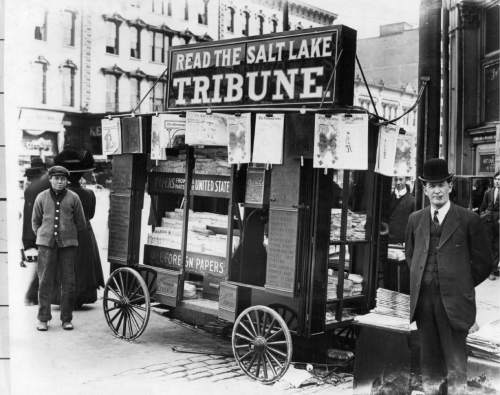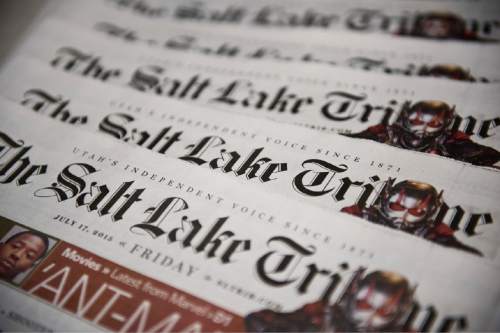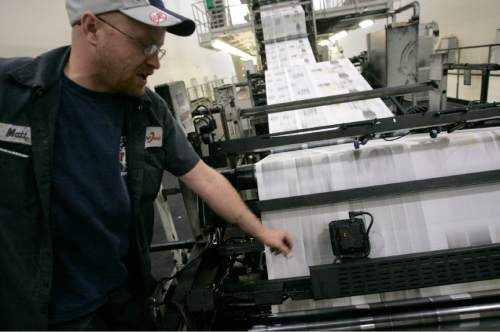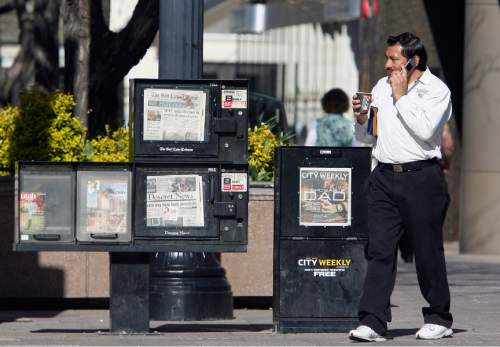This is an archived article that was published on sltrib.com in 2015, and information in the article may be outdated. It is provided only for personal research purposes and may not be reprinted.
A federal court fight over business dealings between Utah's two largest newspapers, The Salt Lake Tribune and Deseret News, is on hold for 120 days by mutual agreement of those involved.
The court-approved cease-fire, begun July 1 and now half over, ostensibly was sought due to several conflicts in the summer schedules of the dozen or so attorneys in the case. But multiple sources confirmed that the lull also has been used for talks on selling The Tribune.
The major players remain tight-lipped, including Utah billionaire philanthropist Jon Huntsman Sr., who has publicly declared an interest in buying Utah's largest daily newspaper.
"I wish I could say more than no comment," Huntsman said last week through an intermediary, "but with everything going on, I can't comment."
Sources familiar with the matter, who requested anonymity because they were not authorized to speak officially, said at least two inquiries to purchase The Tribune have surfaced in recent months. A key bargaining point, they said, has been reworking the paper's current financial partnership with the News before a sale.
Meanwhile, litigation brought against the two dailies by Salt Lake City-based Citizens for Two Voices was reassigned in August to a new judge: former Utah Supreme Court Justice Jill Parrish. Confirmed to the federal bench in May, Parrish takes over from U.S. District Judge Clark Waddoups in what a court clerk said was a workload adjustment unrelated to issues in the case.
The lawsuit targets The Tribune's manager, Digital First Media, and the LDS Church-owned Deseret News over a 2013 deal that dramatically altered the dailies' decades-old partnership, which covers shared operations for printing, advertising and circulation.
The revised joint-operating agreement (JOA) cut in half The Tribune's profits, sold the paper's stake in a West Valley City printing facility and shifted control of joint businesses from The Tribune to the News. The accord reportedly was inked in exchange for a large payment to Digital First's parent company, New York hedge fund Alden Global Capital.
Citizens for Two Voices, made up of former Tribune employees and other community members, sued over the deal in June 2014, claiming it violates anti-monopoly laws and threatens The Tribune's survival.
The Tribune's owners have countered that they have no plans to shutter the paper. The rewritten JOA, they contend, was meant to better position the daily for a digital-centric future.
The JOA also sparked ongoing investigations by antitrust lawyers from the U.S. Department of Justice and the Utah attorney general's office.
Karra Porter, attorney for Citizens for Two Voices, characterized the 120-day delay as a temporary truce.
"We've called it a summer stand down," Porter said.
Joan O'Brien, who heads the grass-roots group, was more pointed.
"Even though we agreed to this, we're not giving up," the daughter of former Tribune Publisher Jerry O'Brien said. "This is not some sort of mutual surrender. We're not done fighting by any stretch. This is a break in the action."
The group racked up several victories before the hiatus. In January, for instance, a judge ordered the News and Digital First to hand over what court papers say is up to 250 banker boxes of business-related documents. Porter said that, by June, they had provided only a couple of three-ring binders of records.
"Our next step," she said, "would have been to go after all those other documents."
Proposals for a delay emerged in early summer, originally discussed for 90 days, Porter said, then extended to 120.
For now, she said, "we are spending this time narrowing down the witnesses we intend to depose and additional documents we intend to request."
Richard Burbidge, lead attorney for The Tribune in the case, and Chris Lee, president of Deseret Digital Media, which oversees the News, did not respond to requests for comment.
Reached last week, Digital First CEO and President Steve Rossi declined to comment for this story.
The Justice Department has not responded to repeated Tribune inquiries on the status of its probe.
If a sale of The Tribune is on the table, it would not surprise industry analysts.
Digital First sought for nearly a year to sell its entire chain of more than 70 dailies and three dozen or so weeklies before those efforts fell through in May. Then-Digital First CEO John Paton — a chief architect of the revamped Tribune-News JOA — has since stepped down, replaced by Rossi, the chain's former chief financial officer.
The New York-based media company, which also owns The Denver Post, San Jose Mercury News and Park City's Park Record, has announced buyouts and layoffs at some of its top dailies and closed down three weeklies in Michigan. It also has shed partial stakes in 11 papers it had held with rival chain Gannett.
Media business analyst Rick Edmonds, with the nonprofit Poynter Institute, a journalism think tank in St. Petersburg, Fla., said "it certainly seems possible that they would sell some properties." He also noted that Rossi took the Digital First helm in July with a reputation as "a strong financial guy who's got an eye on the bottom line."
If The Tribune's finances "are a money-losing situation and a drain," Edmonds said, "there's some likelihood that they'd entertain offers for it."













